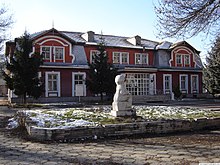Chitalishte

Tschitalischte [ ʧi'taliʃtɛ ] ( Bulgarian читалище , literally translated: reading room ) is a cultural center in Bulgaria. These are typically Bulgarian communal cultural institutions that combine the functions of a library, a theater, an adult education center (foreign languages, dance courses, music courses), a village club and a clubhouse. The literal translation of the reading room or reading hall does not sufficiently reflect the comprehensive cultural mandate of these "cultural multifunctional centers" to "promote artistic creation" and "increase the education of the population". The Tschitalischtes were also used as a cinema, meeting place for pensioners or for party meetings. Currently (as of September 2008) there are over 3370 Chitalishtes in Bulgaria.

During the period of the Bulgarian Revival , more than 130 of these institutions were established, which carried out active propaganda work during the liberation of Bulgaria from Turkish rule. In terms of their political significance, they can best be compared to the workers' sports clubs in Germany, which were later banned. The first of these Bulgarian culture houses were built in Swishtov , Lom and Shumen in 1856 .
In the city descriptions of Bulgarian cities, the structure of a Chitalishte is mostly emphasized in order to emphasize the part of the city in the liberation from the Turks. During the Bulgarian rebirth, the Chitalishtes were the nucleus of the newly awakening national self-confidence - they were educational centers in which the language of the Bulgarians was taught, in which the far-reaching Bulgarian history was taught and thus the Bulgarian national pride was promoted, also by promoting the Bulgarian Culture (dance, song). At that time, outside of the Chitalischtes, Greek was the language of education - because of the supremacy of the Greek Orthodox Church.
After the turnaround in Bulgaria (1989), its role declined sharply, partly because of insufficient funding. Today, in addition to educational and leisure activities (library, dance courses, chess or card clubs, etc.), they also offer an internet café , which has increased the number of visitors since the late 1990s.
Literature and Sources
- Bernhard Fabian: Handbook of German historical book collections in Europe , Georg Olms Verlag, 2001, pp. 221–261, ISBN 3487103591
- ↑ Archived copy ( memento of the original from March 2, 2008 in the Internet Archive ) Info: The archive link was inserted automatically and has not yet been checked. Please check the original and archive link according to the instructions and then remove this notice.